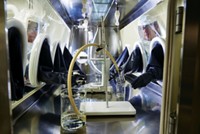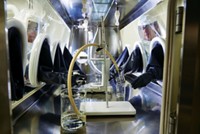Advertisement
Grab your lab coat. Let's get started
Welcome!
Welcome!
Create an account below to get 6 C&EN articles per month, receive newsletters and more - all free.
It seems this is your first time logging in online. Please enter the following information to continue.
As an ACS member you automatically get access to this site. All we need is few more details to create your reading experience.
Not you? Sign in with a different account.
Not you? Sign in with a different account.
ERROR 1
ERROR 1
ERROR 2
ERROR 2
ERROR 2
ERROR 2
ERROR 2
Password and Confirm password must match.
If you have an ACS member number, please enter it here so we can link this account to your membership. (optional)
ERROR 2
ACS values your privacy. By submitting your information, you are gaining access to C&EN and subscribing to our weekly newsletter. We use the information you provide to make your reading experience better, and we will never sell your data to third party members.
Business
The New Millipore
Linked to Germany’s Merck, laboratory tools maker expects to bolster services for the pharmaceutical industry
by Marc S. Reisch
May 9, 2011
| A version of this story appeared in
Volume 89, Issue 19

Heads turned when the German chemical and pharmaceutical maker Merck KGaA inked a $7.2 billion deal in July 2010 to acquire Billerica, Mass.-based Millipore. The deal was as remarkable for its size as for the fact that an important pharmaceutical maker had acquired a significant life sciences industry supplier.
But rather than jeopardize Millipore’s relationships with pharmaceutical customers because of a perceived conflict of interest, ownership by Merck makes the company—now known as Merck Millipore globally and EMD Millipore in North America—a better industry resource, company executives claim.
Merck Millipore combines Merck’s lab chemicals businesses, which has about $600 million in annual sales, with Millipore’s bioprocessing and research tools business, which logs about $2.3 billion in sales. However, the combination was more than about enlarging a lab services franchise; it was about latching onto Millipore’s strategic vision.
Among the reasons that Millipore was attractive to Merck was that it was “an agile and dynamic company,” says Jonathan DiVincenzo, executive vice president and head of Millipore’s bioscience unit, a research tool supplier. Whereas Merck managed its lab chemicals business on a country-by-country basis, Millipore managed its businesses globally. Merck operations were focused on technology; Millipore’s emphasized the customer, he says.
The deal also made sense to Millipore. According to DiVincenzo, just as top Millipore executives were discussing a sale of the firm with potential buyers, company managers had also been going through a corporate exercise to identify “drivers” for their businesses in the years ahead. Merck’s acquisition overtures gained traction among Millipore’s managers when they recognized that Merck could be their ticket to future growth opportunities.
They realized that Merck could, for instance, help them better chart a course in stem cell development, biomarkers and companion diagnostics, and personalized health care, DiVincenzo says. In stem cells, for instance, even though therapeutic applications barely exist, Millipore is working on reactors to produce the cells in large volumes for when the need arises.
In personalized health care, Millipore is looking into how it might help researchers and pharmaceutical firms sift through and make sense of the reams of data pouring out of genetic arrays. And although Millipore could have partnered with several other firms in these areas, Merck could offer guidance in all of them, he says.
Merck’s high-level assistance doesn’t mean customers’ confidences are in jeopardy, DiVincenzo contends. “We have a Chinese wall between the Millipore side and the Merck pharmaceutical side,” he says.
To safeguard relationships, “we put confidentiality agreements in place when we work closely with customers in their labs,” DiVincenzo says. At other times, customer secrets don’t come into play. When it comes to ramping up production of a novel drug, Millipore sticks to its expertise in process development and equipment. “We focus on yield and not so much on the molecule itself,” he says.
Peter Lawson, an analyst with Mizuho Securities who covers the instrumentation field, points out that Roche, for instance, operates a diagnostics business that successfully works with customers who also compete with Roche’s pharmaceutical business. In Millipore’s case, he says he is unaware of any negative effects on business and hasn’t heard “detrimental” comments because of a conflict of interest.
Paul Chapman, vice president of Millipore’s biopharm process solutions business, which provides a range of products and services to biotech manufacturers, tells C&EN that “conflicts of interest are not in our best interest or our customers’ best interest.” He adds, “We respect our customers’ products and use our relationship for the betterment of the industry.”
Collaboration among companies that are sometimes competitors is widespread in the pharmaceutical industry, DiVincenzo points out. Those partnerships generally work out well for others, and he sees no reason why similar ones won’t continue to work well for Millipore. “We have no pride,” he says with a twinkle in his eye. “We work with everyone.”




Join the conversation
Contact the reporter
Submit a Letter to the Editor for publication
Engage with us on Twitter